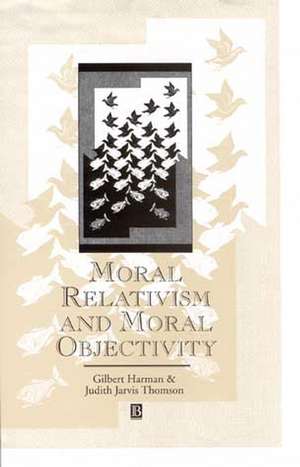Moral Relativism and Moral Objectivity: Great Debates in Philosophy
Autor G. Harmanen Limba Engleză Paperback – 24 noi 1995
Independently, Judith Jarvis Thomson examines what she takes to be the case against moral objectivity, and rejects it; she argues that it is possible to find out the correct answers to some moral questions. In her view, some moral disagreements are like disagreements about whether the house has a ghost.
Harman and Thomson then reply to each other. This important, lively accessible exchange will be invaluable to all students of moral theory and meta-ethics.
Preț: 216.56 lei
Preț vechi: 299.48 lei
-28% Nou
Puncte Express: 325
Preț estimativ în valută:
41.44€ • 43.37$ • 34.49£
41.44€ • 43.37$ • 34.49£
Carte indisponibilă temporar
Doresc să fiu notificat când acest titlu va fi disponibil:
Se trimite...
Preluare comenzi: 021 569.72.76
Specificații
ISBN-13: 9780631192114
ISBN-10: 0631192115
Pagini: 240
Dimensiuni: 152 x 229 x 13 mm
Greutate: 0.37 kg
Editura: Wiley
Seria Great Debates in Philosophy
Locul publicării:Chichester, United Kingdom
ISBN-10: 0631192115
Pagini: 240
Dimensiuni: 152 x 229 x 13 mm
Greutate: 0.37 kg
Editura: Wiley
Seria Great Debates in Philosophy
Locul publicării:Chichester, United Kingdom
Public țintă
upper–level undergraduates and above in ethics, moral philosophy and meta–ethicsNotă biografică
Gilbert Harman is Professor of Philosophy at the University of Princeton. His publications include Thought (1973), The Nature of Morality (1977), and Change in View (1986).
Judith Jarvis Thomson is Professor of Philosophy at the Massachusetts Institute of Technology. Her publications include The Realm of Rights (1990), and Rights, Restitution and Risk (1986).
Descriere
Do moral questions have objective answers? In this great debate, Gilbert Harman explains and argues for relativism, emotivism, and moral scepticism. In his view, moral disagreements are like disagreements about what to pay for a house; there are no correct answers ahead of time, except in relation to one or another moral framework.













